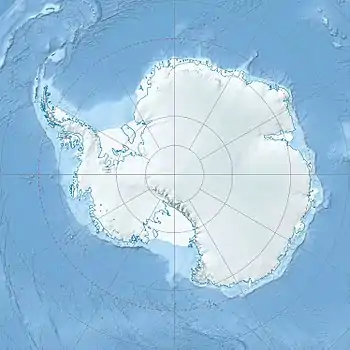Amundsen Glacier
Amundsen Glacier (85°35′S 159°00′W) is a major Antarctic glacier, about 7 to 11 km (4 to 6 nmi) wide and 150 km (80 nmi) long,[1] originating on the polar plateau where it drains the area to the south and west of Nilsen Plateau, and descending through the Queen Maud Mountains to enter the Ross Ice Shelf just west of the MacDonald Nunataks. The tributary Blackwall Glacier flows northwest along the northeast side of Hansen Spur to join Amundsen Glacier.
| Amundsen Glacier | |
|---|---|
 Location of Amundsen Glacier in Antarctica | |
| Location | Ross Dependency |
| Coordinates | 85°35′S 159°4′W |
| Length | 150 km (93 mi) |
| Width | 10 km (6.2 mi) |
| Terminus | Ross Ice Shelf |
It was discovered by Rear Admiral Byrd on the South Pole flight in November 1929.[1] The name was proposed for Roald Amundsen by Laurence Gould,[2] leader of the Byrd AE geological party which sledged past the mouth of the glacier in December 1929.[1]
References
- "Amundsen Glacier | Antarctica NZ".
- "Geographical Names | Conquering the Ice". Retrieved 2020-12-23.
| Types | |||||||
|---|---|---|---|---|---|---|---|
| Anatomy | |||||||
| Processes | |||||||
| Measurements | |||||||
| Volcanic relations | |||||||
| Landforms |
| ||||||
| |||||||
This article is issued from Wikipedia. The text is licensed under Creative Commons - Attribution - Sharealike. Additional terms may apply for the media files.